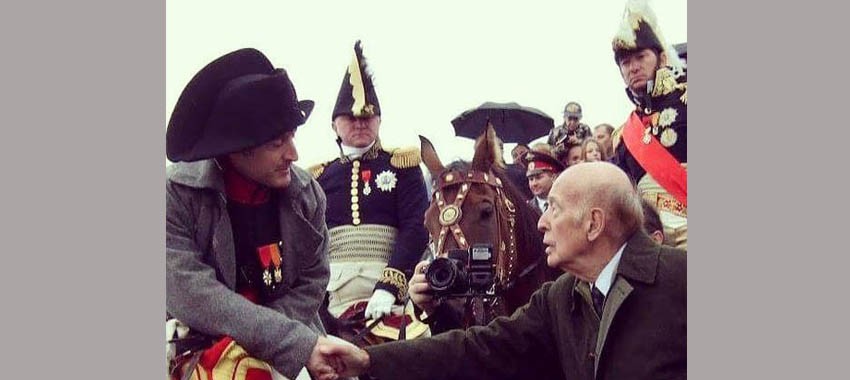President Valéry Giscard d’Estaing (1926-2020) and the Napoleonic world

Here is not the place to recite the political career of President Valéry Giscard d’Estaing (link in French). That has been done abundantly by the printed and digital press in France and elsewhere. We would simply like to highlight a few of the, sometimes surprising, links he had with the Napoleonic world.
In fact, Valéry Giscard d’Estaing was Napoleonic from the cradle. Through his maternal line, the Georges-Picot and the Bardoux families, he was descended from Montalivet, Napoleon I’s Minister of the Interior. His great-grandfather, Agénor Bardoux (1829-1897) was a Bonapartist senator of the Puy-de-Dôme, a political leaning retained (but less publicly) by his grandfather Jacques Bardoux (1874-1959), thanks to whom the future president became linked in the early 1950s with the Prince Louis Napoleon. It was at the Élysée Palace that he awarded him the insignia of Officer of the Légion d’Honneur.
Napoleonic blood clearly ran in his veins since all those who knew Valéry Giscard d’Estaing – who was thought to be (or rather was accused of being) an Orleanist all his life – can testify how passionate he was about the history of the Consulate and the Empire. Olivier Fouquet (current vice-president of the Fondation Napoléon) was then advisor to the Presidency of the Republic, and he remembers how in 1978, during the preparation of his official trip to the USSR, Valéry Giscard d’Estaing asked for a visit to the battlefield of La Moskova (or Borodino) to be included in his programme, which earned the cabinet a lecture on the Russian campaign at its weekly meeting. Leonid Brezhnev gladly acceded to his request, though history does not relate whether the two statesmen debated who won the battle. He returned to La Moskova/Borodino in 2012 for the bicentenary, thereby giving himself the opportunity to shake hands with “the Emperor”, the actor Marc Schneider. The photo (see above) of this amazing moment travelled around the world. It should be added that when he was in power, even though the Chant du départ was his favourite march, he liked to review the troops to the music of La Marche Consulaire. It was also he who, in extremis, managed to get the French National Archives to buy Joseph Bonaparte’s papers from the Wellington family, to prevent them from being dispersed at public auction.
Valéry Giscard d’Estaing was elected to the Académie Française on 11 December 2003 (link in French), occupying chair no. 16, a chair with specific Napoleonic resonances. From 1803, Antoine-Vincent Arnault (1766-1834) (link in French), one of Napoleon’s favourite authors (the Emperor took Arnault’s complete works to St Helena) had occupied it, and then later, from 1822, the philologist Bon-Joseph Dacier (link in French) (to whom Champollion addressed his famous letter announcing the deciphering of the Hieroglyphs) sat there. As for his literary career, it is worth noting that in 2010 he devoted one of his novels, La victoire de la Grande Armée (review in French), published by Plon, to 1812. Whilst it was not exactly the Napoleonic novel of the century, it did show the former president’s passion for things Napoleonic.
In recent years, President Giscard d’Estaing never missed an opportunity to remind both the Fondation’s President Victor-André Masséna and its director Thierry Lentz of this lifelong enthusiasm. For example, he acquired all the volumes of Napoleon’s Correspondance Générale and even honoured our institution with a visit.
Last but not least, many will have noted that President Valéry Giscard d’Estaing passed away on a December 2nd.
To his family, and to the many who were deeply saddened by his passing, the Fondation Napoléon offers its sincerest condolences.
10 December 2020
